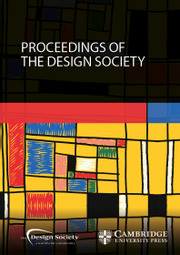Article contents
EXPLORATORY RESEARCH ON CULTURAL COMPUTING FOR HUMAN-COMPUTER INTERACTION. THE CASE OF SUSTAINABILITY.
Published online by Cambridge University Press: 27 July 2021
Abstract
The digital transition refers to the fact that information technology (IT) tools are used in all our activities on a daily basis. In this article, we will study the use of IT tools in engineering activities. It is possible to say that today IT tools accompany engineers in their professional practices. This presence of computing has also enabled the development and considerable changes in human-technologies interactions. Moreover, the socio-economic context has evolved considerably, and environmental issues have taken on an important role in engineering. We ask whether and to what extent these two contexts (digital and ecological) have changed the expectations of design professionals with regard to IT tools. Should the way of addressing the type of human-machine interaction in engineering tools be modified in depth? The objective of this paper is to understand what types of human-computer interaction would allow a more satisfying user experience for those future engineers who are using new technologies and marked by the ecological urgency. To do so, we will focus on a particular engineering context (design for sustainability) and a particular engineering practice (LCA practice).
Information
- Type
- Article
- Information
- Creative Commons
- This is an Open Access article, distributed under the terms of the Creative Commons Attribution-NonCommercial-NoDerivatives licence (http://creativecommons.org/licenses/by-nc-nd/4.0/), which permits non-commercial re-use, distribution, and reproduction in any medium, provided the original work is unaltered and is properly cited. The written permission of Cambridge University Press must be obtained for commercial re-use or in order to create a derivative work.
- Copyright
- The Author(s), 2021. Published by Cambridge University Press
References
- 1
- Cited by

